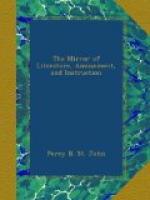The Prussian said he had himself never made a trip to Manicolo with the Tucopians, but the Lascar had gone once or twice. He positively affirmed, that he had seen and conversed at Paiow, a native town, with the Europeans who spoke the language of the islanders. They were old men, he said, who told him that they had been wrecked several years ago in one of the ships, the remnants of which they pointed out to him. They informed him also that no vessel had touched at the islands since they had been there; that most of their comrades were dead, but they had been so scattered among the various islands, that they could not tell precisely how many of them were still living.
On hearing so many circumstances all tending to confirm his suspicions, from the moment he saw the silver sword-guard with the cipher, captain Dillon determined to proceed as quickly as possible to the Manicolo Islands, examine the wrecks himself, and, if practicable, bring off the two men with whom the Lascar had spoken, and whom, he said, were Frenchmen. For this purpose he begged the latter to accompany him, but as he was married and comfortably settled on the island, neither promises nor threats were of any avail, although captain Dillon offered to bring him back to Tucopia. Martin Buchart, on the contrary, was tired of the savage life he had led for the last fourteen years, and gladly acceded to the wishes of captain Dillon, who after prevailing with a Tucopian also to come on board, sailed for the island. Unfortunately, as the ship neared the land, it fell a perfect calm, and continued so for seven days. At this time the stock of dry provisions was nearly exhausted, and there was no animal food to be procured on Tucopia. The crew lived principally on New Zealand potatoes and bananas. The vessel became every day more leaky from a long continuance at sea; and a person on board, who was interested in the cargo, had, during captain Dillon’s stay in the islands, shown himself particularly discontented, and had frequently and warmly remonstrated at what he considered an unnecessary and useless delay; for these reasons, therefore, captain Dillon determined, though with the greatest reluctance, to take advantage of a breeze which sprang up, continued his voyage, and arrived at Bengal with much difficulty, his ship being in a very leaky condition.
Unwilling to abandon his favourite object, captain Dillon now applied to the Asiatic Society, and to the Bengal Government; and in consequence of his representations, his suggestions were at length carried into effect. He was appointed to the command of one of the Company’s cruisers, of sixteen guns and eighty-five men, called the Research; and on the 27th of January, 1827, he sailed from Bengal, visited Van Dieman’s Land, New South Wales, New Zealand, the Friendly Islands, Ro-Thoma, or Granville Island of the Pandora, Tucopia, and arrived at Manicolo on the 27th of September. This island (Manicolo, or Vanicolo) is not the Mallicolo of captain Cook, being situated only 118 miles to the leeward of Tucopia, in latitude 11 deg. 47 min., whilst the former lies in south latitude 16 deg. 15 min.




